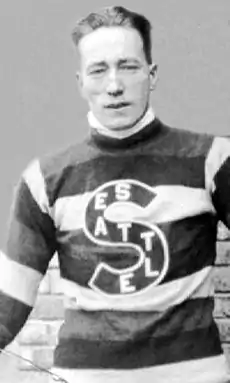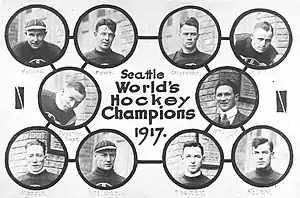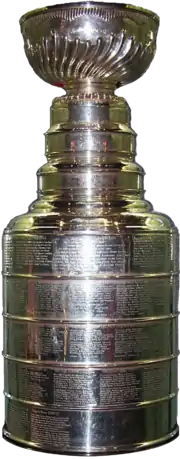1917 Stanley Cup Finals
The 1917 Stanley Cup Finals was contested by the Pacific Coast Hockey Association (PCHA) champion Seattle Metropolitans and the National Hockey Association (NHA) and Stanley Cup defending champion Montreal Canadiens. Seattle defeated Montreal three games to one in a best-of-five game series to become the first United States-based team to win the Cup. The inspiring story of the Mets' 1917 championship was chronicled in the 2019 book, When It Mattered Most.[1] The series was also the first Stanley Cup Final to be played in the United States,[2] and the last Stanley Cup final to not feature a National Hockey League team, as the NHA rebranded as the NHL in November 1917.[3]
| 1917 Stanley Cup Finals | |||||||||||||||||||
|---|---|---|---|---|---|---|---|---|---|---|---|---|---|---|---|---|---|---|---|
| |||||||||||||||||||
| * – Denotes overtime period(s) | |||||||||||||||||||
| Location(s) | Seattle: Seattle Ice Arena | ||||||||||||||||||
| Format | best-of-five | ||||||||||||||||||
| Coaches | Seattle: Pete Muldoon Montreal: George Kennedy | ||||||||||||||||||
| Dates | March 17 – 26 | ||||||||||||||||||
| Series-winning goal | Bernie Morris (7:55, first, G4) | ||||||||||||||||||
Paths to the Finals
Seattle won the PCHA title after finishing the 1916–17 regular season in first place with a 16–8 record. Meanwhile, Montreal advanced to the final series after narrowly defeating the Ottawa Senators, 7–6, in a two-game total-goals playoff series to end the 1916–17 NHA season.
Game summaries

The games of the Final were played at the Seattle Ice Arena. Games one and three were played under PCHA seven-man rules; games two and four were played under NHA six-man rules. Bernie Morris scored 14 of Seattle's 23 total goals for the series, including six in their 9–1 victory in game four.[4] Future Hockey Hall of Fame goaltender Hap Holmes recorded a 2.90 goals-against average for the Mets.
Montreal Canadiens NHA champion roster - George Vezina goalie, Bert Corbeau defence, Harry Mummery defence, Edouard "Newsy" Lalonde (Captain) Center-Rover Tommy Smith center, Didier Pitre right wing, Reginald "Reg" Noble left wing, Jack Laviolette left wing, Louis Berlinguette left wing, Wilfred "Billy" Coutu defence spares - Sarsfield "Steve" Malone center, George "Skinner" Poulin center, Jules Rochon - defence Harold "Hal" McNamara defence Dave Majors defence, Arthur Brooks defence, Joe Maltais right wing, U.P. Boulder (President), George "Kennedy" Kendall (Owner/Manager-Coach),
Seattle Metropolitans PCHA champion roster - Harry "Happy" Holmes goalie, Roy Rickey defence, Everard "Ed" Carpenter defence, Jack Walker rover-right wing, Bernie Morris center, Frank Foyston (Captain) left wings, Jim Riley left wing, Bobby "Stubby" Rowe defence, Carol "Cully" Wilson right wing, Pete Muldoon (Owner/Manager-Coach).
- Game one
In game one, Didier Pitre scored four goals as he led the Canadiens to an 8–4 victory. Pitre opened the scoring in the third minute before Morris tied it four minutes later. Jack Laviolette scored twenty seconds later to put the Canadiens ahead, followed by Pitre to put the Canadiens ahead 3–1 after one period. Con Corbeau and Newsy Lalonde scored in the second to put the Canadiens ahead 5–1 after two periods. In the third, Morris and Frank Foyston scored to bring Seattle within two goals, before Pitre scored again. Morris scored to make it 6–4 before Pitre and Corbeau scored to make the final score 8–4.[5]
- Game two
Seattle tied the series with a convincing win played under NHA hockey rules. Morris opened the scoring at nine minutes of the first period. Wilson scored to make it 2–0 for Seattle after the first period. Morris and Foyston scored in the second to put Seattle up 4–0 after two periods. Frank Foyston then scored twice in the third period to complete his hat trick and give Seattle a lead of 6–0. Seattle then played defensively but Tommy Smith scored in the final minutes for the Canadiens to spoil the shutout. Frustration boiled over at the start of the third period with a fight between Roy Rickey and Billy Coutu before Harry Mummery jumped into the fray.[6]
- Game three
The game was played at a fast clip with no goals before Morris scored after ten minutes. Montreal's goaltender Georges Vézina made several big saves in the second to hold Seattle off from scoring. Coutu and Rickey had their third fight of the series and Coutu was given a twenty-minute penalty and Rickey a ten-minute period. The Canadiens held off Seattle in an ensuing power play to end the second with Seattle holding a one-goal lead. In the third, Foyston scored after five minutes and Morris scored a quick pair of goals to give Seattle a 4–0 lead.[7]
- Game four
In an individual rush, Morris put the Mets ahead early in the first period. The Canadiens tried to fight back, but were stymied by the defences of Seattle. Seattle scored three times in the second period to put the game out of reach. In the third, the onslaught continued, as the Mets led 7–0 before Laviolette scored to break the shut out.[8]
| Game-by-game | Winning team | Score | Losing team | Rules used | Location | |
|---|---|---|---|---|---|---|
| 1 | March 17 | Montreal Canadiens | 8–4 | Seattle Metropolitans | PCHA | Seattle Ice Arena |
| 2 | March 20 | Seattle Metropolitans | 6–1 | Montreal Canadiens | NHA | |
| 3 | March 23 | Seattle Metropolitans | 4–1 | Montreal Canadiens | PCHA | |
| 4 | March 26 | Seattle Metropolitans | 9–1 | Montreal Canadiens | NHA | |
| Metropolitans win best-of-five series 3 games to 1 | ||||||
Stanley Cup engraving
The 1917 Stanley Cup was presented by the trophy's trustee William Foran. The Metropolitans never did engrave their name on the Cup for their championship season.
It was not until the trophy was redesigned in 1948 that the words "1917 Seattle Metropolitans" was put onto its then-new collar.
The following Metropolitans players and staff were eligible to have their names engraved on the Stanley Cup

1917 Seattle Metropolitans
Players
- 4 Frank Foyston
- Jim Riley
- Carol Cully Wilson
- Bobby Rowe (Captain)
- Roy Rickey
- Everard Eddie Carpenter
- 1 Harry Hap Holmes
Coaching and administrative staff
- Pete Muldoon (President-Owner/Manager-Coach)
‡ Played rover, a position between both defences and behind the centre.
Stanley Cup engraving
- Several of the Metropolitans had played together with the 1914 Stanley Cup champion Toronto Blueshirts: Jack Walker had been playing coach of Toronto, with Eddie Carpenter (a substitute with Toronto), Frank Foyston, Hap Holmes and Cully Wilson.[9]
- Pete Muldoon was 29 years and nine months old and is still youngest coach or manager to win the Stanley Cup.[10]
See also
References
- "1916–17 Stanley Cup Winner: Seattle Metropolitans". Hockey Hall of Fame. Archived from the original on 2012-10-20. Retrieved 2006-07-02.
- "hockeyleaguehistory.com – Pacific Coast Hockey Association". Archived from the original on 3 July 2006. Retrieved 2006-07-02.
- Harper, Stephen J. (2013), A Great Game: The Forgotten Leafs & The Rise of Professional Hockey, Toronto: Simon & Schuster Canada, ISBN 978-1-4767-1653-4
- Holzman, Morey; Nieforth, Joseph (2002), Deceptions and Doublecross: How the NHL Conquered Hockey, Toronto: Dundurn Press, ISBN 1-55002-413-2
- Podnieks, Andrew; Hockey Hall of Fame (2004). Lord Stanley's Cup. Triumph Books. pp. 12, 49. ISBN 1-55168-261-3.
- Diamond, Dan, ed. (1992). The Official National Hockey League Stanley Cup Centennial Book. Firefly Books. pp. 48–49. ISBN 1-895565-15-4.
- Notes
- Ticen, Kevin (2019). When It Mattered Most: The Forgotten Story of America's First Stanley Cup, and the War to End All Wars. ISBN 1798208490.
- Ticen, Kevin (28 January 2020). "Seattle Metropolitans win the Stanley Cup on March 26, 1917". HistoryLink.org.
- Holzman & Nieforth 2002, p. 159
- Ticen, Kevin (April 2019). When It Mattered Most. Seattle, WA: Clyde Hill Publishing. ISBN 978-1798208496.
- "Canadiens Won By Good Margin From Seattle". Montreal Gazette. March 19, 1917. p. 16.
- "Seattle Outplayed the Canadiens in Game Last Night". Montreal Daily Mail. March 21, 1917. p. 8.
- "Mets Take Lead In Struggle for Old Stanley Cup". Montreal Daily Mail. March 21, 1917. p. 8.
- "Seattle Wrest the Stanley Cup from Flying Frenchmen". Montreal Daily Mail. March 27, 1917. p. 8.
- Harper 2013, p. 272.
- Ticen, Kevin (April 2019). When It Mattered Most. Seattle, WA: Clyde Hill Publishing. ISBN 978-1798208496.
| Preceded by Montreal Canadiens 1916 |
Seattle Metropolitans Stanley Cup Champions 1917 |
Succeeded by Toronto 1918 |
